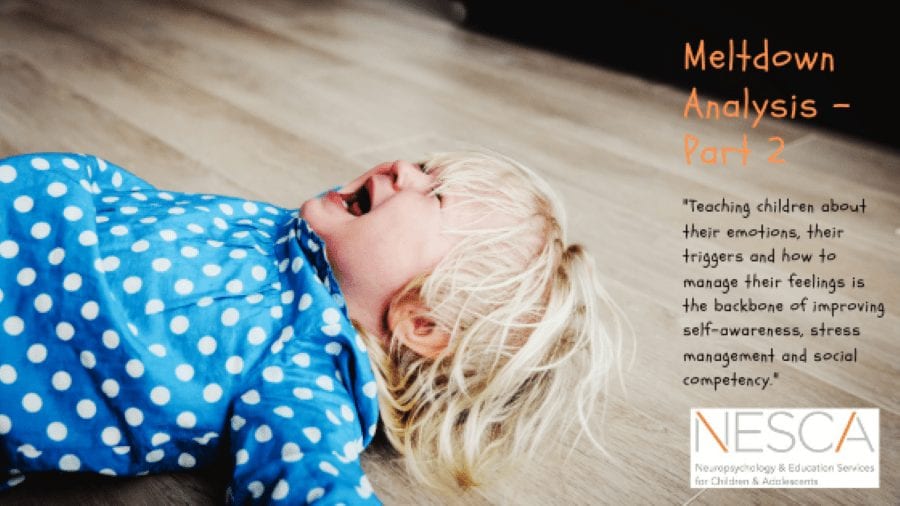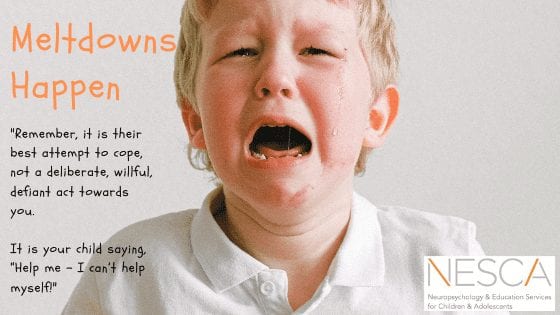

By: Ann Helmus, Ph.D.
NESCA Founder/Director
I’m sure you can agree, it’s been an interesting time due to the onset of COVID-19. Our worlds, livelihoods and professional lives have been turned upside down. At NESCA, where our entire business revolves around the in-person evaluations, assessments, coaching and treatment of children, adolescents and young adults, much of our “In Real Life (IRL)” activity had to be put on hold to prevent the risk of infection among our clients and staff.
After making the decision to temporarily close our physical offices, our clinical and administrative staff swiftly geared up to provide as many services as possible remotely. While we were considered an “essential” business by the State of Massachusetts, we opted to pause our neuropsychological testing for the safety of all involved while initiating research into how we could conduct this critical service to our families. We are keenly aware of the long wait times for testing and the associated stress that puts on parents while they seek out answers about their children’s behavior or learning differences—all the while making children who need supports earlier than later wait in the wings as well. We also knew there would be an increased need for testing because of the impact COVID-19 was and is likely to have on the mental health of children and teens; schools would eventually be inundated with a back-log of evaluations already in the works as well requests for new evaluations that, by law, have to be conducted within a specific time period; and to help fulfill the ever-present need to assist schools and parents in providing support to children with special needs.
Knowing our pause of testing was not a long-term, viable option, after careful consideration and much intense research, we identified several options on how we could bring our neuropsychological evaluation services back to the NESCA community. The options we identified as possibilities included conducting teletherapy, using a partial plexiglass screen (akin to what you would see protecting a store cashier), observing social distancing and constructing a two-office model. We examined the risk to both clients and clinicians, privacy and technology constraints, ethics surrounding the validity of the test findings and legal issues concerning the credibility of evaluation findings/diagnosis among other topics.
While we determined that teletherapy has a role in the testing process, including parent intake and feedback sessions, we ultimately decided that it would not be a solution for NESCA to adopt for the actual evaluation of a child. Next, the partial plexiglass shield did not provide enough risk mitigation for the child or evaluator, and it may not have been a secure enough physical barrier for some of the more aggressive children we test to keep both parties properly distanced.
So, where does that leave us? We do have social distancing in the mix as a potential option. While it does not provide maximum risk reduction, some families see it as the most natural option. The child, and if necessary, a parent helper, are at one end of a long conference table, and the evaluator is at the other end, at least six feet away at all times. All people in the room wear masks to further reduce risk. All testing materials are set up in advance for the child or parent helper. Most tests can be conducted on an iPad, which is controlled by the evaluator’s computer.
 Since we were very aware that some parents would not be comfortable with this model, we continued our exploration and education, landing on an innovative two-office model. The two-office set-up involves a four foot by eight foot clear plexiglass window to be installed between two offices. This allows for clear observation of the child by the evaluator, the ability for the child and evaluator to communicate with each other via a high-quality intercom system and for the evaluator to visually demonstrate activities that the child is asked to perform during testing. A parent helper can be allowed in the room with the child should they need support during the session. Again, many of the tests would be administered via an iPad, which is controlled by the evaluator in the adjoining room. All additional test materials are organized and arranged in the office where the child is prior to testing.
Since we were very aware that some parents would not be comfortable with this model, we continued our exploration and education, landing on an innovative two-office model. The two-office set-up involves a four foot by eight foot clear plexiglass window to be installed between two offices. This allows for clear observation of the child by the evaluator, the ability for the child and evaluator to communicate with each other via a high-quality intercom system and for the evaluator to visually demonstrate activities that the child is asked to perform during testing. A parent helper can be allowed in the room with the child should they need support during the session. Again, many of the tests would be administered via an iPad, which is controlled by the evaluator in the adjoining room. All additional test materials are organized and arranged in the office where the child is prior to testing.
 NESCA’s two-office approach was piloted in our Londonderry, N.H. office by Dr. Angela Currie. Due to its maximum risk reduction for all parties and its similarity to the standard testing experience, NESCA expanded its testing capabilities with this model to the Newton office, where there are currently two of these testing areas available. While it does have some limitations, it is working very well with our families.
NESCA’s two-office approach was piloted in our Londonderry, N.H. office by Dr. Angela Currie. Due to its maximum risk reduction for all parties and its similarity to the standard testing experience, NESCA expanded its testing capabilities with this model to the Newton office, where there are currently two of these testing areas available. While it does have some limitations, it is working very well with our families.
Along with the new testing models implemented, NESCA is, of course, taking all precautions available to reduce risk of exposure. We require risk assessment questionnaires, temperature checks and hand sanitizing; implemented a “touchless” check-in process; limit the number of people to a total of eight at one time in the 7,000 square foot Newton office, with testing being done at opposite ends of the office; provide private waiting rooms for parents who are not involved in the child’s testing; and sanitize all equipment and rooms used both before and after every appointment. We continue to follow the CDC and State’s guidelines for re-opening requirements.
We are very proud of our ability to continue to serve parents, children, families and schools during this extremely difficult time. I am once again so grateful to the cohesive and collaborative team we have in place here at NESCA and for its creativity, innovation, determination and dedication. The needs of families with children who have special needs never stop. While we may be forced to pause, NESCA will do everything in its power not to stop either.
Resources/Notes:
- To view the Federation for Children with Special Needs webinar with Dr. Ann Helmus, visit Testing in the Age of Remote Learning
- Dr. Helmus will present, “Testing in the Time of Covid,” to the Massachusetts Urban Project, a statewide network of special education leaders from 15 urban school districts across the state, on June 9.
- Dr. Helmus will present on this topic in conjunction with Massachusetts Advocated for Children in June TBD.
About the Author:
NESCA Founder/Director Ann Helmus, Ph.D. is a licensed clinical  neuropsychologist who has been practicing for almost 20 years. In 1996, she jointly founded the Children’s Evaluation Center (CEC) in Newton, Massachusetts, serving as co-director there for almost ten years. During that time, CEC emerged as a leading regional center for the diagnosis and remediation of both learning disabilities and Autism Spectrum Disorders.
neuropsychologist who has been practicing for almost 20 years. In 1996, she jointly founded the Children’s Evaluation Center (CEC) in Newton, Massachusetts, serving as co-director there for almost ten years. During that time, CEC emerged as a leading regional center for the diagnosis and remediation of both learning disabilities and Autism Spectrum Disorders.
In September of 2007, Dr. Helmus established NESCA (Neuropsychology & Education Services for Children & Adolescents), a client and family-centered group of seasoned neuropsychologists and allied staff, many of whom she trained, striving to create and refine innovative clinical protocols and dedicated to setting new standards of care in the field.
Dr. Helmus specializes in the evaluation of children with learning disabilities, attention and executive function deficits and primary neurological disorders. In addition to assessing children, she also provides consultation and training to both public and private school systems. She frequently makes presentations to groups of parents, particularly on the topics of non-verbal learning disability and executive functioning.
To book an evaluation with Dr. Helmus, NESCA Founder and Director, or one of our many other expert neuropsychologists, complete NESCA’s online intake form.
Neuropsychology & Education Services for Children & Adolescents (NESCA) is a pediatric neuropsychology practice and integrative treatment center with offices in Newton and Plainville, Massachusetts, as well as Londonderry, New Hampshire. NESCA serves clients from preschool through young adulthood and their families. For more information, please email info@nesca-newton.com or call 617-658-9800.





 and academia for over 30 years. She is a national consultant and speaker on program design and the inclusion of children and adolescents with special needs, especially those diagnosed with Autism Spectrum Disorder (ASD). Prior to joining NESCA, Ms. Lucci was the Principal of the Partners Program/EDCO Collaborative and previously the Program Director and Director of Consultation at MGH/Aspire for 13 years, where she built child, teen and young adult programs and established the 3-Ss (self-awareness, social competency and stress management) as the programming backbone. She also served as director of the Autism Support Center. Ms. Lucci was previously an elementary classroom teacher, special educator, researcher, school psychologist, college professor and director of public schools, a private special education school and an education collaborative.
and academia for over 30 years. She is a national consultant and speaker on program design and the inclusion of children and adolescents with special needs, especially those diagnosed with Autism Spectrum Disorder (ASD). Prior to joining NESCA, Ms. Lucci was the Principal of the Partners Program/EDCO Collaborative and previously the Program Director and Director of Consultation at MGH/Aspire for 13 years, where she built child, teen and young adult programs and established the 3-Ss (self-awareness, social competency and stress management) as the programming backbone. She also served as director of the Autism Support Center. Ms. Lucci was previously an elementary classroom teacher, special educator, researcher, school psychologist, college professor and director of public schools, a private special education school and an education collaborative.






 By
By 
Connect with Us